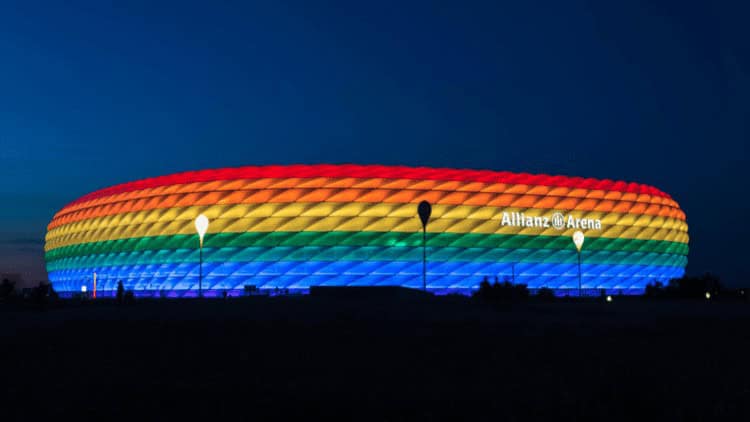The international football governing body’s action in Qatar conflicts with its own guidance on human rights.

The 2022 men’s World Cup host-nation Qatar is known for its human-rights abuses relating to women, migrant workers and those from the LGBT+ community. Same-sex relationships in Qatar are illegal and punishable by up to seven years in prison. As Qatar is hosting one of the most popular global sporting events, these human-rights abuses are now under scrutiny on the world stage.
The latest issue arose as the England and Wales captains were set to defy FIFA (Fédération Internationale de Football Association) by wearing ‘OneLove’ armbands during the tournament. The rainbow armbands were a gesture against discrimination and in support of LGBT+ rights. On the eve of the tournament, however, FIFA announced its own social campaign armbands—its president, Gianni Infantino, saying that ‘we have clear regulations on armbands’.
It was said that players found to be wearing the rainbow armbands could face on-the-pitch sanctions, including yellow cards. That threat seems to have worked, as the teams subsequently decided not to wear the armband, explaining in a joint statement from several football associations:
We were prepared to pay fines that would normally apply to breaches of kit regulations and had a strong commitment to wearing the armband. However, we cannot put our players in the situation where they might be booked, or even forced to leave the field of play.
There has been a passive acceptance of discrimination from many, including FIFA and the United Kingdom government. This was reflected in comments by the UK foreign secretary, James Cleverley, who said that ‘a little bit of flex and compromise’ needed to be shown by LGBT+ fans attending the Qatar World Cup. Cleverly urged fans to be ‘respectful of the host nation’.
In response to the issues with Qatar, the UK Football Association said it had received ‘the unequivocal answer that all fans, including those from LGBTQ+ communities, will be welcome at Qatar 2022, and that the safety and security of every fan is Qatar’s top priority’. Just two weeks before the start of the World Cup, however, a Qatari official told German media that homosexuality was ‘damage in the mind’ and that gay people had to ‘accept our rules here’.
These comments seemingly appear misguided on the surface but they conceal a much bigger issue. There should be no ‘flex and compromise’ around human rights. Criminalising LGBT+ people is not a cultural choice but a human-rights assault and it is a universally important issue. Yet the lines appear blurred for many in the case of the World Cup.
Contradictory stance
Qatar’s stance on LGBT+ human rights is seemingly in conflict with FIFA values and raises serious questions as to the governing body’s position. FIFA claims that it is ‘committed to respecting all internationally recognised human rights and shall strive to promote the protection of these rights’. Its policy states that discrimination of any kind, including against sexual orientation, is ‘strictly prohibited and punishable by suspension or expulsion’.
FIFA adopted the United Nations Guiding Principles on Business and Human Rights in 2016. The UN has repeatedly confirmed that discrimination based on a person’s sexual orientation, gender identity and sex characteristics is contrary to international human rights law.
FIFA also created a human-rights and anti-discrimination department in 2020. This is underpinned by the requirement for the body to take measures to mitigate and prevent human-rights infringements.
The treatment of people from the LGBT+ community in Qatar appears to be in direct conflict with FIFA’s purported values. Instead of condemning Qatar’s human rights abuses, FIFA has asked nations competing to ‘focus on football‘ and stop ‘handing out moral lessons’.
Long-term repercussions
The former FIFA president, Sepp Blatter, recently said that giving Qatar the World Cup had been a mistake and had been the result of political pressure. Qatar is said to invest billions into world football, which highlights the stark reality that human rights do, apparently, have a price. The long-term impact of the Qatar World Cup on LGBT+ issues in football, despite the verbal condemnation of the discrimination by some, may be felt for many years to come.
Historically football in the UK has been notoriously discriminatory against those from the LGBT+ community. However, this appears to be improving. The Blackpool player Jake Daniel is the UK’s first—and only—active male professional footballer to come out publicly as gay since Justin Fashanu in 1990. This is a huge step forward for LGBT+ people in sport.
However, there is still stigma surrounding LGBT+ individuals in football. The harsh rhetoric and lack of action from various governing bodies and the UK government around the World Cup may compound football’s homophobia and deter further footballers from coming out. It could also influence the career choices of budding players or those who want to work within the sector. LGBT+ fans are already boycotting the World Cup, saying they feel excluded from the game.
Being LGBT+ is not a lifestyle choice or a value that people can or should be made to compromise or ‘flex’. And freedom from discrimination because of sexuality is a fundamental human right. Those who take part in this World Cup are arguably complicit in such discrimination.
This article is republished from The Conversation under a Creative Commons licence
Sophie is a senior fellow in the Health Services Management Centre of the University of Birmingham. Previously, she was a senior lecturer in education and inclusion at the University of Worcester.

